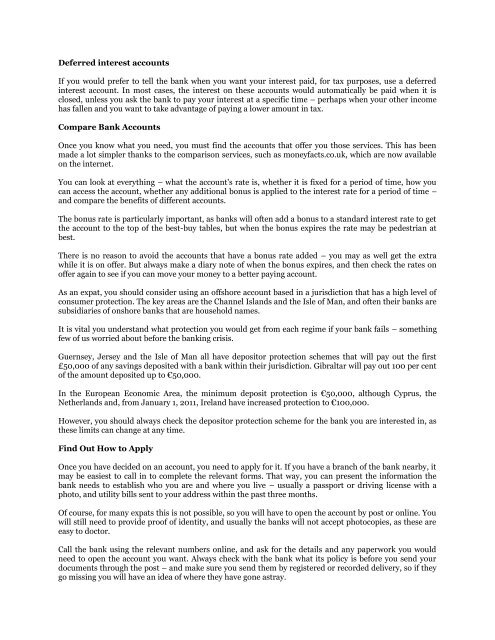Expat guide: Offshore deposits by Bowman Offshore Bank Transfers
We all work hard for our money, whether we are living and working in the UK, or overseas as an expat.
We all work hard for our money, whether we are living and working in the UK, or overseas as an expat.
You also want an ePaper? Increase the reach of your titles
YUMPU automatically turns print PDFs into web optimized ePapers that Google loves.
Deferred interest accounts<br />
If you would prefer to tell the bank when you want your interest paid, for tax purposes, use a deferred<br />
interest account. In most cases, the interest on these accounts would automatically be paid when it is<br />
closed, unless you ask the bank to pay your interest at a specific time – perhaps when your other income<br />
has fallen and you want to take advantage of paying a lower amount in tax.<br />
Compare <strong>Bank</strong> Accounts<br />
Once you know what you need, you must find the accounts that offer you those services. This has been<br />
made a lot simpler thanks to the comparison services, such as moneyfacts.co.uk, which are now available<br />
on the internet.<br />
You can look at everything – what the account's rate is, whether it is fixed for a period of time, how you<br />
can access the account, whether any additional bonus is applied to the interest rate for a period of time –<br />
and compare the benefits of different accounts.<br />
The bonus rate is particularly important, as banks will often add a bonus to a standard interest rate to get<br />
the account to the top of the best-buy tables, but when the bonus expires the rate may be pedestrian at<br />
best.<br />
There is no reason to avoid the accounts that have a bonus rate added – you may as well get the extra<br />
while it is on offer. But always make a diary note of when the bonus expires, and then check the rates on<br />
offer again to see if you can move your money to a better paying account.<br />
As an expat, you should consider using an offshore account based in a jurisdiction that has a high level of<br />
consumer protection. The key areas are the Channel Islands and the Isle of Man, and often their banks are<br />
subsidiaries of onshore banks that are household names.<br />
It is vital you understand what protection you would get from each regime if your bank fails – something<br />
few of us worried about before the banking crisis.<br />
Guernsey, Jersey and the Isle of Man all have depositor protection schemes that will pay out the first<br />
£50,000 of any savings deposited with a bank within their jurisdiction. Gibraltar will pay out 100 per cent<br />
of the amount deposited up to €50,000.<br />
In the European Economic Area, the minimum deposit protection is €50,000, although Cyprus, the<br />
Netherlands and, from January 1, 2011, Ireland have increased protection to €100,000.<br />
However, you should always check the depositor protection scheme for the bank you are interested in, as<br />
these limits can change at any time.<br />
Find Out How to Apply<br />
Once you have decided on an account, you need to apply for it. If you have a branch of the bank near<strong>by</strong>, it<br />
may be easiest to call in to complete the relevant forms. That way, you can present the information the<br />
bank needs to establish who you are and where you live – usually a passport or driving license with a<br />
photo, and utility bills sent to your address within the past three months.<br />
Of course, for many expats this is not possible, so you will have to open the account <strong>by</strong> post or online. You<br />
will still need to provide proof of identity, and usually the banks will not accept photocopies, as these are<br />
easy to doctor.<br />
Call the bank using the relevant numbers online, and ask for the details and any paperwork you would<br />
need to open the account you want. Always check with the bank what its policy is before you send your<br />
documents through the post – and make sure you send them <strong>by</strong> registered or recorded delivery, so if they<br />
go missing you will have an idea of where they have gone astray.


